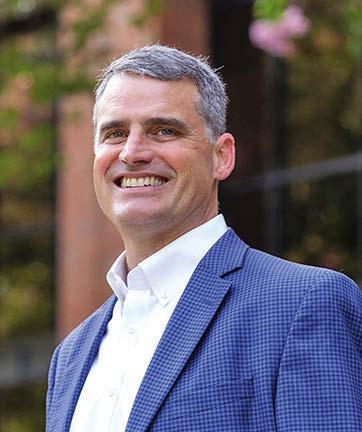
9 minute read
A multifront conflict
A legal battle between Brown & Root and a new consulting arm of CSRS is about more than what meets the eye: At stake is getting a leg up in the growing renewable energy sector. BY STEPHANIE RIEGEL
IN EARLY MARCH, Brown and Root Industrial Services sued two of its former top executives and the company they now work for— Fides Consulting, an upstart subsidiary of local engineering firm CSRS. The 19th Judicial District Court suit alleges Andy Farris and Kevin Steed violated noncompete agreements when they left BRIS, took BRIS trade secrets with them, and recruited BRIS employees to work at Fides.
Two months later, BRIS upped the ante in the legal battle, filing suit in federal court against seven of its former engineers, alleging the mid-level employees took confidential files and documents from BRIS prior to leaving the company to go work for Fides.
Among the defendants are Farris’ sons, Daniel and Michael Farris.
While the legal battle may not be particularly unusual by large-market corporate standards, it is noteworthy in Baton Rouge’s tight-knit business community, in part, because it pits two of the city’s best-known business leaders—Jim Bernhard and Tim Barfield—against each other, though neither is named nor mentioned in either lawsuit.
BRIS is owned by businessman Jim Bernhard’s private equity firm Bernhard Capital Partners.
Fides is owned by CSRS, whose president, Tim Barfield, was a longtime executive at Bernhard’s former company, The Shaw Group, serving as its president and COO in the early 2000s.
Beyond that, however, the litigation is interesting because BRIS is a large, established industrial contractor while Fides is a small, startup consulting firm. On the surface it might seem puzzling that Goliath would go after the proverbial David—until you understand that Fides was formed specifically to work with Houston-based Grön Fuels on the development of a proposed $9.2 billion, low-carbon, renewable diesel facility at the Port of Greater Baton Rouge.
The Grön deal has been years in the making and is still wending its way through the regulatory approval process. But if it comes to fruition, as expected, it could be just the beginning of a series of investments and ancillary projects related to the facility, which will be one of the largest renewable diesel plants in the region.
The BRIS suits, experts say, illustrate the competitive nature of that burgeoning field. Renewable energy is a growing, high-stakes industry. Attracting—and retaining—qualified talent is key for success.
“In the energy business today, human capital is very important, particularly as you are building these clean energy projects,” says David Dismukes, executive director of the LSU Center for Energy Studies. “These people don’t just drop out of thin air. You don’t just go to LSU and hire someone right out of school.”
ALLEGATIONS AND DENIALS
Executives with BRIS and CSRS decline to comment on the cases because of the ongoing litigation. Attorneys for both sides have made limited comments.
“Obviously our position is set forth in the petitions,” says BRIS attorney Eric Miller.
But in the months since the initial suit was filed, both sides have laid out their respective claims in dozens of court documents.
According to documents filed by BRIS in March, Andy Farris, who was BRIS’ CEO at the time of his departure, and Steed, the former president of BRIS’ engineering division, violated their noncompete agreements shortly after they left BRIS by hiring away at least six engineers, designers, and managers, who followed them to Fides.
“Farris and Steed have directly or indirectly in violation of their agreements targeted key employees and key positions of BRIS for employment with Fides for the purpose of competing directly with BRIS where CSRS and/or Fides was not in a position to do so previously,” court documents

DON KADAIR

FAMILIAR FACES: Though neither is directly involved in the lawsuits, the legal action has two high-profile business leaders—and former Shaw Group comrades—squaring off: Jim Bernhard, left, whose private equity firm owns Brown and Root Industrial Services, and Tim Barfield, president of CSRS, which owns Fides Consulting.
filed by BRIS attorneys say.
In later documents, BRIS alleges that several of those employees downloaded confidential information from their computers onto USB drives, and are using the information “… for the benefit of Fides and to the detriment of BRIS.”
In their own filings, Fides’ attorneys deny Farris and Steed breached their contracts or conspired to harm BRIS, and suggested the employees left BRIS because they were unhappy with a corporate culture that didn’t treat them fairly.
“The basis of BRIS’ lawsuit is simply that Farris and Steed had commenced employment with Fides, WHICH IS NOT A COMPETITOR OF BRIS,” court documents filed by Fides’ attorneys say. “Due to its failure to properly pay and fairly compensate its management employees for hours actually worked, but which were not billable directly to a customer project, BRIS became acutely aware that additional disgruntled employees were actively soliciting and intending to seek employment at Fides.”
“BRIS … alleges a civil conspiracy claim against Fides,” the documents continue, “ … but cites no facts to support the conspiracy claim … and fails to cite any law to support its conspiracy claim.”
At least initially, 19th Judicial District Court Judge Donald Johnson agreed with Fides. At a hearing in April, he denied BRIS’ request for a temporary restraining order that would have barred Farris and Steed from working at Fides and forced them to pay damages, agreeing with Fides’ attorneys that there was no cause of action under the law.
In early June, Johnson delivered another partial victory to Fides, throwing out most of BRIS’ claims, though the underlying breach of contract claim remains intact. But he also handed BRIS a partial victory, ordering the defendants to respond to depositions—which, until now, they have refused to do—in the event the case eventually goes to trial. He also gave BRIS the opportunity to file an amended complaint, which it did in late June.
In other words, the case is not over.
Meanwhile, BRIS is plowing ahead with a similar action in the U.S District Court for the Middle District of Louisiana, which legal experts say is a strategic move.
“They’re trying to hedge their bets,” says Kevin Levy, the Holt M. Harrison professor of law at LSU’s Paul M. Hebert Law Center, who was not familiar with the particular details of the case but was commenting generally. “If they lose in one court, at least they can try in the other.”
According to the federal suit, “Defendants formed a plan to take and/or utilized confidential information and trade secrets to get Fides up and running to further their employment with Fides and to compete directly with BRIS …,” court documents allege.
The federal suit doesn’t name Fides. Rather, it targets mostly younger and mid-level engineers, who followed Farris and Steed to work for Fides, where, according to documents filed by Fides in the state court suit, they would be treated better and compensated more fairly than they had been at BRIS.
But BRIS alleges the engineers didn’t simply leave one firm for another. Its court filings allege the defendants copied “thousands of confidential BRIS files related to manpower, estimates, projects and proposals …” onto USB drives prior to their departure from the company.
At least one of the defendants also allegedly “emailed confidential information and trade secrets to his personal email address,” court documents say.
The BRIS petition includes the detailed results of a forensics analysis of the defendants’ computers and names the dozens of case files they allegedly accessed.
The suit names Jaeson Brown, Jeffrey Hebert, Robert Huval, Mitchell Morgan and David Sterken, in addition to Farris’ sons. It seeks a jury trial, damages and injunctive relief that would prohibit the defendants from engaging in their “illegal conspiracy.”
As of publication deadline, attorneys for the defendants had yet to file their response to the petition. But Preston Castille, an attorney for Fides, says the defendants deny the allegations.
“We have said they’re sort of forum shopping and we will seek to have it dismissed,” Castille says.

A BATTLE FOR TALENT
For now, legal experts say there’s no way to know how the cases will turn out. The outcome of noncompete suits can vary widely depending on the language in the contracts, Levy says.
“A lot depends on how the noncompete clause is written
COLLIN RICHIE
BRIAN BAIAMONTE
and what, specifically, it says,” according to Levy. “The judge will really have to get into the weeds on the claims both sides are making.”
But while the cases may hinge on the verbiage of employment contracts, the case is about larger issues— namely, competition for a piece of the renewable energy business.
The first phase alone of the proposed Grön Fuels complex is impressive. If it comes to fruition and demand for renewable fuels grows, as projected, the facility could be just the beginning of spin-off projects that tie into state and regional agricultural resources and infrastructure networks.
What’s more, the Grön facility would be one of the largest such facilities in the region and its low-carbon footprint would open the door to all sorts of opportunities in the growing Low Carbon Fuel Standard credits market.
That kind of work takes highly specialized employees. There aren’t many of them here.
“People come and go in the energy business and it can get very competitive when you get very, very specialized,” Dismukes says. “The more specialized you are the more competitive it is.”
Perhaps more importantly, the renewables field is emerging and Dismukes says nobody in this space, at least in the Baton Rouge market, has a huge leg up on anybody else.
That helps explain why the battle for the former BRIS employees is so intense. Grön and its backer, Fidelis Infrastructure—a Houston private equity fund headed by still another former executive from The Shaw Group, Dan Shapiro—have chosen to hitch their wagon to a star in the CSRS constellation, not BRIS or some other company in Bernhard’s portfolio. Viewed through that lens, the lawsuits are not just a war for talent HIGH STAKES: Construction of renewable energy facilities, like this biodiesel refinery in Thailand, is predicted to escalate in the region and having the techni cal talent available to work on such projects is key in this battle. but a battle to stake out territory in a sector that many see as the future of the energy industry in the Gulf Coast region. “A lot of these facilities are first of a kind,” Dismukes says. “It’s a little like putting a puzzle together and your experience in certain areas is what is critical in this—to have all this experience and background. Everybody has their little niche.”

ISTOCK

November 15
University Club Golf Course Tee off in bad plaid for Louisiana’s kids!
Register for sponsorships today! ololchildrens.org/tackypants
BENEFITING:










